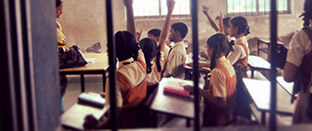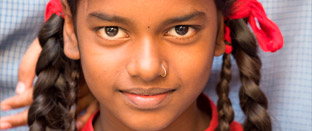ABOUT US

HOW WE WORK

Project Cycle

Mumbai Smiles’s work is structured around projects. Each project is a set of activities and actions that pursue the same goal in a given period of time, and that make use of specific resources. Projects have a process from their origin to their execution and evaluation which we call the “project cycle”. Its phases are as follows:
- Identification and analysis of participation, problems, objectives and alternatives. The involvement of the involved community is crucial for the possible development of the project right from this stage.
- Planning and budgeting: In this phase we use the Logical Framework Approach, the most used by international cooperation organizations and agencies. This tool directs each project and all its elements towards the achievement of a specific goal. At the same time, the necessary budgets are defined to be able to cover the costs of each project.
- Implementation: In this phase, the Mumbai Smiles teams carry out the defined activities using the planned resources, which, if done correctly, will allow the proposed goals to be achieved.
- Monitoring and evaluation: At the same time when the activities are carried out, information is obtained on the degree of success of the same, in order to assess whether the right path is being followed or whether adjustments and corrections should be made. At this point, teams elaborate monthly reports and submit them to the program managers. In addition, the managers can carry out random follow-up visits to review the progress of the project on the ground and whenever it is appropriate, they take timely decisions. We also understand that follow-up does not make sense without the participation of the beneficiaries. For each project, a committee is formed in which they express their opinions and points of view on the progress of the activities, the quality of the services provided and their suggestions to improve them. At the end of each financial year, together with the teams, including the committees of beneficiaries, we make a final evaluation of each project. In this we assess the degree of fulfilment of each objective, and what have been the strengths as well as the aspects to be improved in the execution of the project. This information allows us to draw lessons and conclusions to improve the implementation of future projects.
For the implementation of the projects, Mumbai Smiles works with its own local team in the field or with local entities. The majority of our projects follow the system described, and from Mumbai Smiles we coordinate the implementation of all these phases.
In some cases, there are projects in which Mumbai Smiles works with local entities, which share our same values and strategic goals and which have previously planned the implementation. With no exception, in both the cases the monitoring and evaluation is performed in the same way as described above.
Mumbai Smiles always ensures compliance with its own code of ethics and child protection policy in all projects implemented, in addition to ensuring that the values, mission and vision of the organization are ratified and complied by all participants involved in the development of a project. The objective measurement of the impact and results generated, as well as in compliance with administrative requirements required by local authorities, are always indispensable in the achievement of projects.
Partners

The Mumbai Smiles projects are implemented by local partners (also called “partners”) with which specific agreements are signed. These local partners are chosen according to a series of criteria. Firstly, they must be legally registered entities that comply with all local authorities’ administrative requirements, in order to implement development cooperation projects.
Secondly, the values, mission and vision of the local partner are specifically assessed to see if they are consistent and compatible with those of Mumbai Smiles. It is expected that the partner will share the same concern for the rights of women and children. They are required to expressly accept Mumbai Smiles’ ethical code and child protection policy.
Thirdly, the entity’s technical and financial capabilities are assessed in terms of the implementation of the projects and the objective measurement of the impact they are having and their results. To this end, their annual activity reports and audit reports are reviewed, and how they ensure in their work the involvement of communities and their empowerment, as well as the participation of local volunteers.
If the evaluation has been favourable, the specific agreement is signed, under which the partner will be in charge of the direct implementation of the project or the projects that they are responsible for. Also, it will send periodic reports to Mumbai Smiles detailing the progress of these projects and the degree of fulfilment of the planned objectives. Mumbai Smiles also carries out monitoring and follow-up visits to evaluate whether the projects are developing as planned and, if not, assessing possible alternatives in a consensual manner with the local partner.
Partners 2021-22

SAPREM (India)
Chhori (Nepal)
JAL India (Pondicherry)




Action Protocols

Mumbai Smiles has defined its performance standards that all team members, volunteers and collaborators must accept. These protocols must also be explicitly accepted by external entities with which we establish collaboration agreements.


EVALUACIÓN Y MONITORIZACIÓN

A fin de realizar una gestión eficaz de todos los proyectos, hacer un seguimiento de los resultados y los objetivos no alcanzados, y mantener la transparencia, en Sonrisas de Bombay supervisamos todas las actividades del proyecto y evaluamos sus resultados.
Ciclo del proyecto
Para que nuestro trabajo sea sistemático y eficaz, hemos adoptado un método de trabajo al que llamamos ciclo del proyecto: una secuencia de acciones para desarrollar, implementar y evaluar los proyectos.
El objetivo de esta metodología es mejorar la gestión de los proyectos, asegurando que todos los temas relevantes y condiciones se tomen en cuenta durante su diseño e implementación.
Al aplicarlo, el ciclo del proyecto consiste en un conjunto de conceptos de diseño y gestión, técnicas y tareas que se utilizan para apoyar la toma de decisiones.
Evaluación & Monitorización
En Sonrisas de Bombay realizamos un gran esfuerzo para alcanzar los máximos estándares de calidad en el trabajo que realizamos. Por ello contamos con un Departamento de Monitorización y Evaluación de proyectos desde el cual se establecen las estrategias seguidas por la organización para garantizar una eficaz implementación de los proyectos, el óptimo impacto de nuestras intervenciones y contribuir a una constante mejora de las futuras intervenciones.
Las principales características del sistema de seguimiento, evaluación y aprendizaje de nuestros proyectos son:
Monitoreo tanto de la consecución de los resultados de los proyectos como de su impacto en las comunidades beneficiarias con el fin de superar los desafíos, poder medir la consecución de los objetivos establecidos y, en caso necesario, redefinirlos.
Acciones periódicas de seguimiento y evaluación de los proyectos, tanto internas, llevadas a cabo por los propios protagonistas de nuestros proyectos, a través de las comisiones de beneficiarios/as; como externas, a través de evaluaciones de impacto desarrolladas por expertos externos.
Seguimiento y evaluación de proyectos para garantizar una correcta rendición de cuentas hacia nuestros donantes, la máxima transparencia y facilitar la gestión de los proyectos y maximizar los impactos.


COMISIONES DE BENEFICIARIOS Y BENEFICIARIAS

Las comisiones de beneficiarios y beneficiarias son el espacio en los que las comunidades están representadas para articular sus preocupaciones y propuestas, en definitiva para participar en el seguimiento y evaluación de los proyectos y en su planificación. En estas comisiones se vela para conseguir una justa representación tanto de las mujeres como de otros grupos minoritarios.
En Sonrisas de Bombay, un aspecto importante de nuestro ciclo de proyecto es la creación de una “Comisión de beneficiarios y beneficiarias” para cada proyecto.
En el sector de la cooperación, creemos que es fundamental implicar en la detección de las necesidades y en el diseño y desarrollo de los proyectos, a las personas para las que en realidad se desarrolla el proyecto.
Trabajamos para que los y las beneficiarias de nuestros proyectos tengan voz y una justa representación para articular sus preocupaciones y poder hacer una correcta valoración de sus necesidades.
Otra ventaja de formar estas comisiones es que dan fuerza a su papel en la monitorización y la evaluación del proyecto, haciendo de este un proceso más participativo. Las personas que participan asisten a las reuniones junto con el equipo de proyectos para planificar y diseñar las intervenciones de desarrollo.
Los miembros de cada comisión son identificados en base a dos factores:
Su habilidad para comprender y articular temas.
Dar una representación equitativa de las mujeres, castas y grupos minoritarios.








